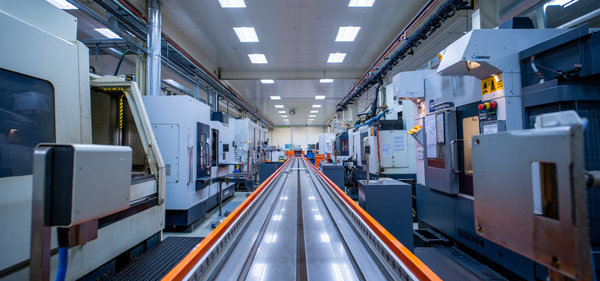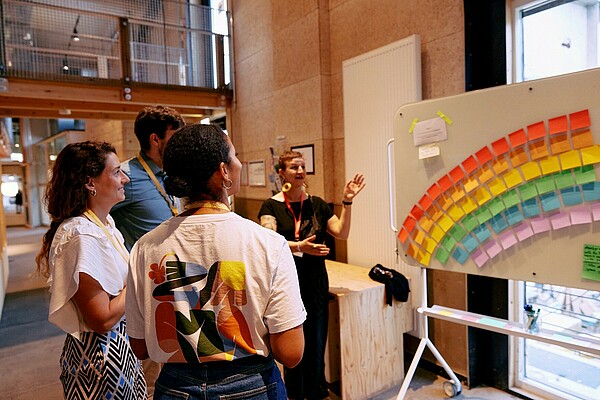Powering Europe's Net-Zero Future
Learn about the Berlin innovators who want to make the global economy climate-friendly with new technologies.
As Germany positions itself as a global technology leader with ambitious climate protection goals, Berlin has emerged as the beating heart of the energy transition. The German capital is not just participating in the race to net-zero – it's leading it, with massive investments flowing into clean technologies and a thriving ecosystem that brings together world-class research, innovative startups, and forward-thinking policy support.
What makes Berlin special? It's the perfect storm of international talent, excellent scientific institutions, a robust startup ecosystem, innovation policies that consistently support relevant technologies, and outstanding business support through Berlin Partner, the city's economic development organization. But perhaps most importantly, Berlin understands that tackling the net-zero challenge requires diversity – not just one silver bullet, but a comprehensive portfolio of technologies working in harmony.
This strategic approach has positioned Berlin as Europe's net-zero technology hotspot, where companies and research institutions are active across the entire spectrum of climate solutions. From energy storage to carbon capture, from synthetic fuels to smart materials, Berlin's innovators are writing the playbook for a carbon-neutral future.
Let's take a rapid tour through the various sectors to get a glimpse of the multitude of players and gain an impression of the ecosystem's diversity – while naturally not being able to provide a complete overview of all the innovative work happening in the city.
Energy Storage: Powering the Renewable Revolution
Reliable storage is a critical factor for any renewable energy system, and Berlin is home to some of Europe's most innovative battery and energy storage companies. These companies are solving one of the biggest challenges of the energy transition: how to store renewable energy when the sun isn't shining and the wind isn't blowing.
Theion is revolutionizing battery technology with sulfur crystal batteries that can store up to three times more energy than current generations. This breakthrough could enable electric cars to travel over 1,000 kilometers on a single charge and make electric flights economically viable.
Meanwhile, Scale Energy has become the market leader in industrial battery storage solutions, leveraging underutilized industrial grid connections to create scalable systems that lower energy costs and stabilize electricity grids.
Terra One takes a different approach, using AI-optimized battery storage to efficiently store and profitably market renewable energy. With a project pipeline of over 20 GWh, they're planning to play a leading role in the European energy market.
On the thermal storage side, Lumenion has developed high-temperature storage systems that can capture fluctuating wind and solar power and convert it into thermal energy with virtually no losses, making it available on-demand for industrial processes or district heating.
The research community is equally impressive. Scientists at the Federal Institute for Materials Research and Testing (BAM)are developing promising alternatives to conventional lithium-ion batteries. Their innovative solid-state battery approach could lead to energy storage solutions that charge faster, last longer, and offer superior sustainability – representing the next generation of energy storage technology. BAM is also collaborating with HZB and Humboldt University to establish the Berlin Battery Lab, which will pool the expertise of these three institutions to advance the development of sustainable battery technologies – an important complement to the equally broad research being conducted at TU Berlin.
Synthetic Climate-Neutral Fuels: Bridging the Gap to Zero Emissions
While electrification advances rapidly, certain sectors like shipping, aviation, and heavy industry will rely on liquid fuels for the foreseeable future. Berlin's synthetic fuel innovators are ensuring these fuels can be climate-neutral.
C1 Green Chemical has developed ultra-efficient catalysis to mass-produce green methanol, enabling the shipping and chemical industries to save gigatons of CO₂. Their breakthrough uses quantum-chemical simulations and lab experiments to create a new catalysis process that operates at competitive prices using decentralized, non-fossil feedstock at low pressures and temperatures.
In aviation, Spark e-Fuels is advancing net-zero flight with proprietary e-fuel technology that overcomes existing barriers to using cheap renewable energy in production. Unlike conventional methods requiring continuous electricity and hydrogen supplies, Spark's approach seamlessly accounts for intermittent renewable energy availability, significantly cutting costs while ensuring high production output.
STOFF2 has developed the innovative Zinc Intermediate Step Electrolyzer (ZZE), which separates power consumption and hydrogen production in time. This enables demand-oriented hydrogen production and the utilization of otherwise curtailed renewable energy, making 100% renewable energy systems possible through green hydrogen.
Industrial giant Siemens Energy brings scale to the equation, developing integrated technologies covering the entire hydrogen value chain – from wind farms through power transmission and large-scale water electrolysis to compression, transport, storage, and hydrogen-based power generation. Demonstrating their commitment to Berlin as a hydrogen hub, Siemens has invested 30 million euros in an electrolyzer production facility in Berlin with a capacity of 3 GW per year.
Graforce offers another pathway, converting natural gas into hydrogen through plasmalysis, which according to the company requires only one-fifth of the energy needed for water electrolysis to produce the same amount of hydrogen.
Renewable Energy: Maximizing Clean Power Generation
Berlin's renewable energy sector extends beyond the conventional, exploring innovative approaches to maximize clean power generation from every possible source.
The Helmholtz-Zentrum Berlin (HZB) has achieved a world record in solar cell efficiency with their tandem solar cell technology. Combining CIGS (Copper, Indium, Gallium, Selenium) and perovskite layers, they've reached an impressive 24.6 percent efficiency. These thin-film solar cells require minimal energy and materials, resulting in a remarkably low ecological footprint and can even be applied to flexible surfaces. A silicon-perovskite combination achieved an even more impressive 32.5 percent efficiency.
On the more unconventional side, Shit2Power is revolutionizing wastewater treatment by transforming sewage treatment plants into power plants. Their compact sewage sludge utilization system aims to make sewage sludge a resource for heat and electricity generation, turning water treatment facilities of any size into self-sufficient power plants.
Carbon Capture and Storage: Removing CO₂ from the Equation
Berlin is at the forefront of carbon capture technologies, with companies developing solutions that range from direct air capture to industrial emission reduction.
Ucaneo has developed a pioneering biomimetic Direct Air Capture technology that operates at room temperature with high energy efficiency. Similar to the human lung, their system doesn't create strong covalent bonds but dissolves CO₂ as bicarbonates using bio-catalysts and electrochemistry. Their fully electric units, with capacities of 500-1000 tons of CO₂ each, can be deployed in a plug-and-play fashion.
Meloon brings cutting-edge graphene-based membrane technology to industrial carbon capture. Their simplified mechanical approach is easy to maintain and operate, and can reduce emissions in the cement industry by over 50%. The technology also applies to steel, biogas, petroleum, chemical industry, paper industry, and waste incineration.
NeoCarbon captures carbon at scale by leveraging existing infrastructure in the form of waste heat and cooling towers, transforming industrial emitters into carbon removal leaders.
The Technische Universität Berlin's Department of Process Dynamics and Operations is developing what could be described as "a washing machine for greenhouse gases" – an innovative CO₂ capture technology developed in collaboration with thyssenkrupp Uhde and Holcim that could significantly reduce the carbon footprint of the cement industry.
Blue Skies Minerals offers a unique approach with their Carbonated Tailings Process, which blends carbon with ground mining wastes and additives, permanently converting the carbon to carbonate minerals while improving mining waste management and eliminating toxic metal releases.
Climate-Friendly Materials: Building a Sustainable Future
Berlin is at the forefront of materials innovation, where companies are developing alternatives to traditional carbon-intensive materials and processes.
Dunia pioneers a paradigm shift in materials discovery by integrating artificial intelligence and robotic precision into the Design-Make-Test-Analyze cycle. Their physics-informed AI and cutting-edge robotic platform rapidly execute electrochemical experiments, providing traceable, reproducible results for materials innovation.
ecoLocked converts captured carbon into functional, carbon-negative building materials, combining carbon storage and utilization for maximum impact. Their products permanently store carbon in the built environment while reducing the need for fossil raw materials and delivering targeted functionalities like thermal insulation and weight reduction.
Alcemy is transforming the cement and concrete industry through machine learning and control technology. By predicting quality properties of cement and concrete in real-time, they're helping the most emission-intensive industry achieve higher quality, lower production costs, and massive CO₂ savings. Their solutions are now in use in one-third of all German cement plants and over 30 ready-mix concrete plants.
Measurement Technology: Monitoring Progress with Precision
Accurate measurement is crucial for the net-zero transition, and Berlin's measurement technology companies are providing the tools needed to track progress and optimize performance.
AIRMO operates at the intersection of climate tech and space, developing a micro-LiDAR solution for continuous, global, near-real-time greenhouse gas emissions measurement using small satellite constellations. Their technology significantly improves the accuracy and sensitivity of CO₂ and CH₄ measurements from space.
Yamakoe takes a terrestrial approach, developing solar-powered on-tree sensors that serve as early detection and prevention systems for wildfires. Given that almost 70% of wildfires worldwide are human-caused and 45% of EU wildfires could be prevented by keeping humans away from high-risk areas, their solution addresses both climate adaptation and mitigation. This is particularly important as wildfires are also a major source of CO₂ emissions, making their prevention crucial for climate protection.
Ammonit, a wind energy pioneer since 1989, provides measurement systems designed to calculate energy yield forecasts, monitor wind and solar power plants, and analyze power curves of wind turbines – essential tools for optimizing renewable energy performance.
Business Models for Rapid Net-Zero Technology Deployment
Berlin's strength isn't just in developing technologies – it's also in creating business models that accelerate their deployment at scale.
Enpal, Germany's greentech unicorn, offers an integrated solution for renewable energy and has already integrated approximately 260,000 Distributed Energy Resources into their system. Their comprehensive ecosystem includes solar panels, battery storage, EV charging stations, heat pumps, and the leading energy trading platform Enpal.One+.
GIGA.GREEN specializes in designing, developing, and operating commercial solar energy systems, battery storage, and charging infrastructure. Their comprehensive service model, from planning and financing to maintenance, makes it easy for businesses to benefit from solar energy without upfront investment.
Cloover provides one-click, worry-free access to renewable energy through cost-effective, full-service subscriptions delivered digitally via partners. Their embedded product improves every step of the customer journey, focusing on the best possible customer experience.
Trawa addresses Europe's high electricity costs through AI-powered energy procurement combined with battery storage and flexibility marketing, enabling companies to reduce their energy bills by up to 30% annually while accessing sustainable power.
NeXtWind focuses on repowering – replacing aging wind turbines with new, more efficient models at the same locations, typically increasing energy production by a factor of 3.5.
Caeli Wind operates the leading online platform for analyzing and brokering wind potential areas, connecting landowners, project developers, and investors while significantly increasing implementation probability and speed.
Tilt provides straightforward data analytics, tools, and expert insights to support SMEs in their environmental transformation, aiming to enable every Small and Medium Enterprise in the EU to get the necessary funding and know-how for net-zero transformation by 2050.
Energy and Resource Efficiency: Doing More with Less
Efficiency remains one of the most cost-effective paths to emission reduction, and Berlin companies are pioneering smart solutions across sectors.
KUGU's digital decarbonization solutions help real estate companies achieve their emission targets. Their products function as intelligent extensions of digital boiler rooms, controlling energy systems through optimization and real-time monitoring to demonstrably reduce CO₂ emissions and energy consumption by up to 30%.
Concular offers comprehensive solutions to make real estate circular and future-proof. From individual consulting and comprehensive software solutions like building resource passports and Life Cycle Assessments (LCA) to brokering circular materials directly sourced from existing buildings, Concular accompanies its clients through the entire process.
Purpose Green specializes in decarbonizing the building sector through its hybrid end-to-end solution for energy renovations and ESG management. Their proprietary "Energy Light" tool provides real-time insights into buildings' energy status, while their digital platform Green+ delivers instant energy analysis for individual buildings or entire portfolios.
Enter is the first fully automated platform for energy-efficient building modernization. With the Enter app, any property can be digitally recorded in just minutes – including material analysis, energy status, and modernization needs. Enter’s AI engine generates tailored, realistic renovation paths – adapted to CO₂ pricing, subsidy programs, energy costs, and climate targets. The platform automatically suggests suitable implementation partners from a nationwide network.
Ecoworks pioneers serial renovation, bringing digitalization and industrialization to existing building stock. They retrofit existing buildings with prefabricated thermal building envelopes, integrating insulation, windows, thermal protection, and ventilation systems at the factory level, dramatically reducing construction times while achieving higher energy efficiencies.
Offsetting and Carbon Management: Ensuring Quality and Impact
As companies work toward net-zero targets, Berlin's carbon management companies are ensuring that offsetting efforts deliver real climate impact.
Carbonze provides autopilot SaaS applications for carbon accounting, offsets, and reduction strategies for SMEs. Their scientific approach offers precise, actionable insights for accurate measurement, combining advanced carbon accounting with strategic guidance for sustainable growth.
Carbonsate is at the forefront of carbon dioxide removal technology, specializing in both hardware and software solutions for permanent, large-scale atmospheric carbon removal through biomass storage.
Senken addresses greenwashing risks in carbon credits through AI quality control encompassing over 600 data points, excluding low-quality projects to maximize climate impact.
CinSOIL leverages satellite data and AI to enable agri-food businesses to inset carbon emissions at farm level through carbon farming. Their evidence-based measurement, monitoring, reporting, and verification SaaS solution helps restore soil health and biodiversity through regenerative agricultural practices.
Klim creates joint movements with farmers, businesses, and consumers to scale regenerative agriculture, sustainably reducing CO₂ emissions while improving soil health and biodiversity.
Vaayu uses proprietary AI and machine learning to calculate impacts including carbon emissions, water, and waste across products, packaging, and logistics. They provide granular insights for data-driven decision-making and regulatory compliance.
ATMO helps corporations accelerate progress toward net-zero targets through insetting rather than offsetting, focusing on project execution and financing within value chains to implement decarbonization projects and build climate resilience.
A Thriving Financial Ecosystem
Berlin's net-zero technology sector benefits from a sophisticated financial ecosystem that understands the unique needs of climate tech companies. The city hosts several venture capital firms with specific expertise in net-zero technologies, including Extantia, Planet A, World Fund, Carbon13, Climentum Capital, the DeepTech & Climate Fonds, and Revent. Carbon13, which expanded from Cambridge to Berlin, operates a unique five-month Venture Builder programme that brings together 80 bright minds from technology, science, and business to form teams and develop climate tech startups addressing earth's critical life support systems. These specialized investors bring not just capital but also deep sector knowledge and networks that help startups scale their solutions.
This financial infrastructure, combined with Berlin's broader startup ecosystem, creates an environment where innovative climate technologies can move from laboratory to market with unprecedented speed and support.
The Power of Collaboration
Perhaps Berlin's greatest asset is its collaborative ecosystem. The city's energy cluster brings together companies, research institutions, policymakers, and investors in a network that accelerates innovation and deployment. This interconnectedness means that breakthroughs in one area quickly benefit others, creating a multiplier effect that amplifies the impact of individual innovations.
The presence of world-class research institutions like the Helmholtz-Zentrum Berlin, the Technische Universität Berlin, and the Federal Institute for Materials Research and Testing provides a constant pipeline of scientific breakthroughs, while organizations like the Climate Change Center Berlin Brandenburg or the Center for Sustainable Resources at Freie Universität Berlin coordinate research activities focused on resource-efficient and circular material synthesis and utilization.
Berlin's approach to the net-zero challenge reflects the city's broader character: international, collaborative, innovative, and pragmatic. By fostering diversity in technologies and approaches, supporting both startups and established companies, and maintaining strong connections between research and industry, Berlin has created an ecosystem that's not just participating in the energy transition – it's leading it.
As the world races toward net-zero targets, Berlin stands ready as the innovation hub that will power Europe's sustainable future. For companies and researchers looking to be part of this transformation, there's no better place to be than at the heart of the action, in Germany's dynamic capital.
If you're committed to the net-zero goal and want to leverage the fantastic opportunities that Berlin's ecosystem offers, don't hesitate to reach out. Wolfgang Korek, Head of Unit Energy | Environment | Smart City at Berlin Partner for Business and Technology, and his team are ready to help you explore how Berlin can accelerate your climate tech ambitions and connect you with the right partners, resources, and opportunities in this thriving innovation hub.
--
Header image: IDEOGRAM






